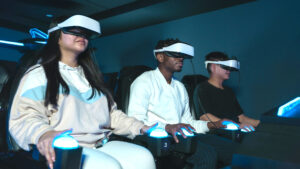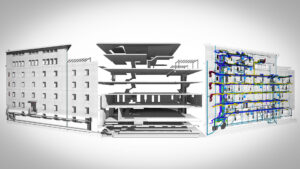Metaverse: a concept that comes from afar.
Origins of the Metaverse.
The term Metaverse originated in 1992 in the cyberpunk world and has recently gained prominence due to its use by Facebook. It is the evolution of the Internet but does not replace it.
It’s not easy to define as a concept; we can say it’s a blend of interconnected worlds and technologies (including AR and VR), governed by avatars.

Discovering the Metaverse: A Virtual Reality to Explore.
A parallel world where reality and virtuality merge into a symphony of infinite experiences: welcome to the metaverse. A new digital dimension that is rapidly changing our perception of the online and offline world.
The metaverse is a digital creation that goes beyond Virtual Reality. It is a network of interconnected virtual worlds where users can explore, socialize, work, and create, all through digital avatars. This concept has captured the imagination of thousands of people worldwide, opening up new possibilities in sectors such as entertainment, education, work, and more. Just as it is happening with MetaMEP.
The idea of a metaverse is not new, as mentioned, but it is gaining momentum thanks to technological developments that enable more realistic and immersive experiences. Platforms such as Decentraland, Fortnite, and Second Life are bringing the metaverse into the spotlight, allowing users to create personalized virtual worlds, buy and sell digital goods, and interact with millions of people from around the world.
Metaverse and Business: Opportunities and Challenges for Companies.
It’s not just a place for fun; it’s also a fertile ground for business opportunities. Companies are beginning to explore its potential to reach new customers, enhance internal collaboration, and innovate within their industries.
In the metaverse, companies can host virtual events, create digital showrooms, offer consulting services, and much more. The metaverse is redefining the concept of a “workspace,” allowing employees to connect from anywhere in the world through digital avatars, creating new opportunities for remote work and global collaboration.
However, it also presents unique challenges, including online security, data privacy, and reputation management. Companies must address these challenges with caution as they seek to make the most of the opportunities offered by this profound innovation.
The Future of the Metaverse: What Does This New Reality Hold for Us?
The metaverse is still in the development phase, but it is gaining momentum, and its future looks promising. Technological advancements, mass adoption, and user creativity will continue to shape this new digital reality.
In the future, we might see the metaverse integrate even more into our daily lives. We could wear virtual or augmented reality devices that allow us to access the metaverse anytime and anywhere. Experiences could become even more realistic and immersive, paving the way for new ways of learning, working, and socializing. MetaMEP is heading in this direction, developing integrated digital solutions that add unique value to BIM models.
The metaverse could also have a significant impact on society, ranging from politics to culture and art. Its ability to connect people from around the world in a virtual environment could lead to greater intercultural understanding and new forms of artistic expression.
A rapidly growing digital reality that presents endless opportunities and challenges. It’s a playground for individuals and businesses, a space where ideas can come to life, and connections can be strengthened. As the metaverse continues to evolve, all we can do is await with curiosity what the future holds in this fascinating digital dimension.




